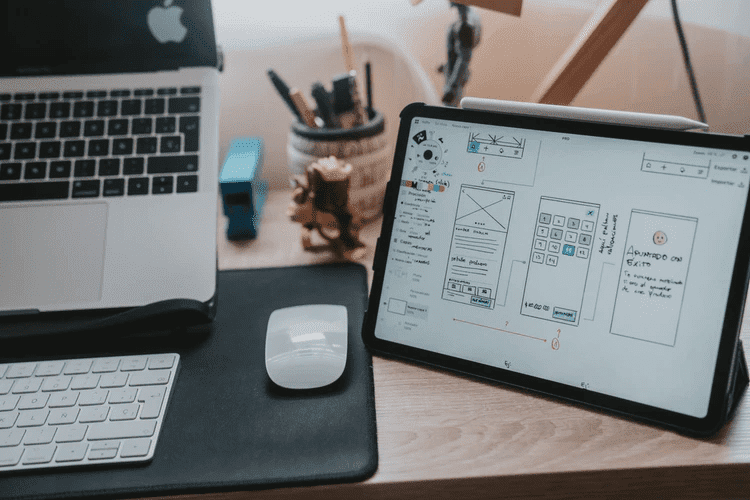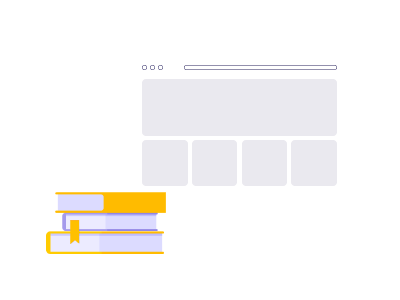Web design is increasingly becoming a relevant skill in the current digital era. Simply put, web design definition means developing websites that are accessible through the internet. The designing phase involves various processes, ranging from programming to designing its layout. This includes integrating the important web design elements, web design framework and more using web design tools.

By learning the meaning of web design, you can build your business and promote it using a blog or website. Having a properly designed website is important for a business, especially for gaming websites, such as Casino Tricks, where there is a need to keep up with the competition and stand out from other gaming platforms.
Obviously, web design is available for website professionals who can sort your needs. However, a better option, especially in the current world, is learning web design and development.
Read: How To Create A Website When You Are Not A Website Designer?
Benefits of Learning Web Design
Before looking at where you can learn web design, it is worth mentioning the importance of taking web design courses. Below are some reasons why you should consider web design:
-
Pays off Time Investment Quickly
Most people refuse to take a class in web design because they don’t think that time invested in these courses is worth the result. While successful web development requires complete time and dedication, it presents great money-making opportunities. Unlike other professions, students with passion can start building their careers while still in school. You will certainly have to make a lot of sacrifices, but the future rewards are worth it.
-
Acquire New Skills
Like other computer science courses, you shouldn’t necessarily have a technical background to study web design. All you need is to be creative, far-sighted, progressive, and ready to implement various web design ideas. Among the new skills and web design fundamentals you get to learn, include scripting, CSS, HTML, programming, JavaScript, SEO, PHP, and design creation.
That aside, after graduating, students can develop a fully functional website and have an understanding of how to promote websites and other platforms to attract traffic.
-
Skills are Always in Demand
As mentioned before, the web design world is just getting started and expected to increase over the coming years. As more industries and businesses adopt digital technologies, all associated professions are poised to remain relevant as well. That said, web development skills will always be in demand, as businesses and companies need webmasters.
These skills also present endless career growth opportunities. For instance, you can become a web content specialist, graphic designer, SEO specialist, production artist, marketer, and game developer with basic web design skills. With these skills, you will always be on-demand, especially as most websites and gaming platforms, such as
Indian Ruby, always search for experts with multiple skills.
-
Good Salary
Web design salary is another reason why you should join this field. While your income depends on the duration of projects and clients’ pay, good web designers earn between $50,000 and $90,000 annually. Note that your income increases as you continue building your web design portfolio and advancing skills.
Where to Learn Web Design Quickly
With the benefits outlined above, you have all the reasons to learn web design. Below are the top 5 avenues to learn website designing quickly.
1. Udemy
Udemy is probably the cheapest and quality website for anyone looking to learn web design. Besides web design, there are other courses on the platform, including Photoshop. However, the main problem with Udemy is the massive resources library, which makes it tough to choose a specific course. Below are some of the best web design courses from the platform:

- Master Web Design in Photoshop
The majority of web designers use Photoshop as their premiere web design software for many reasons. That said, it is good for web designers to learn Photoshop, even at its basic level, and this Udemy course is the best place to begin. This is an 11-hour course comprising video lessons that teach learners basic web design terminology and a step-by-step guide on creating designs from scratch.
If you’ve tried Photoshop before, you know that it contains an endless menu and tools that can be overwhelming. However, this web design for beginners course highlights all you need, ranging from icon design, typography, color selection, and other fundamental skills.
- Workflow of Modern Web Design
If you have some basics about web design, consider enrolling in the Workflow of Modern Web Design course. This professional routine doesn’t focus on web design guidelines but focuses on sturdy workflow concepts used in most projects. For example, students learn wireframing, rapid iteration, design briefs, and planning site development from scratch.
The course comprises videos of more than 8 hours that guide students on developing a site from the start to a completed product in detail. You also learn how to craft websites that meet the best practices of specific industries.
This is a must-learn course if you intend to venture into professional web design.
- Profitable Freelance Web Design
As the name suggests, this is a great course of choice for those who want to make money from their skills. The course was designed by Cristian Doru and highlights various sample projects that earned him more than $4k. This is more than 20-hour video content focuses on the following:
- Designing with Adobe Photoshop CC
- Tips for finding freelance website development projects
- Setting contracts and finding solutions for clients
- Building efficient workflow for repetition of future designing projects
- UI Design with Photoshop
This course delves deeper into web design tips and the mockup website development process. UI Design with Photoshop goes beyond ordinary courses, as it provides insights on how to craft user interfaces using Adobe Photoshop. Therefore, this course includes developing responsive mobile apps and other native applications. It is prudent to have some Photoshop experience before enrolling in this course.
- Landing Page Design Fundamentals
Web designers with an interest in marketing will benefit from this course. As the name suggests, the course provides insights on designing customized landing pages and optimizing them for conversion. Essentially, the course is split between marketing and design, and how the two intersect.
For brands that intend to launch new startup businesses or a product, the course provides insights on practical techniques of increasing revenue through website design. This includes A/B testing of different site layouts and page copies, optimizing CTAs, identifying effective sales funnel, typography, and solving UX issues.
- Creating Responsive Web Designs
Creating a responsive website is overly important, especially in the current age where mobile internet users have surpassed desktop users. Therefore, designers without any skills in creating a responsive website should enroll in this course for some enlightening. Unlike others, this course is quite straightforward and quick. Moreover, it focuses on important topics that modern web developers should understand.

2. Codeacademy
Like Udemy, Codeacademy packs several resources for anyone who wants to learn web design. Courses in this platform are meant to polish knowledge on HTML and CSS skills, navigation, and color designs. In addition, Codeacademy has beginner-friendly and intermediate courses, each concentrating on various aspects of web design.
Beginner-friendly Codeacademy courses include:
- Building a website with CSS, HTML, and GitHub – this is a 10-week course that introduces beginners to coding and helps them learn web design basics. By the end of the course, you should be able to create a simple personal website.
- Learn HTML – website developers should learn HTML since this is the foundation of web pages. Several web design examples were built using HTML, and you can’t add text, images, or videos without these skills. Students learn commonly used HTML tags in structuring HTML pages, which is the skeleton of every website.
- Web design with NameCheap – with more than 1,230,463 graduates, this course is important for those who want to develop websites using the basics, such as CSS3, HTML5, and Bootstrap. Like other courses, there are no web design qualifications to enroll in the course, and it takes a maximum of 9 hours.
Intermediate Codeacademy courses include:
- Learn CSS – 8 lessons
- Learn Bootstrap – 2 lessons
- Learn SASS – 4 lessons
- Learn responsive design – 2 lessons
- Learn color design – 2 lessons
- Learn navigation design – 2 lessons
- Learn intermediate CSS – 10 lessons
3. Coursera
Coursera is probably the biggest and most popular provider of massive open online courses. The platform partners with several great universities, such as Yale, Princeton, and Stanford, to provide great online web development courses. Some of the best Coursera programs include:
- Web design for everybody – includes lessons on HTML5, creating text and titles, and using CSS3 to style websites using color and font. You also learn the tips for designing interactive websites using JavaScript.
- HTML, CSS, and JavaScript for Web Designers – this is an all-in-one course for web development. The course starts by teaching how to create simple pages using HTML, styling them using CSS framework, then using JavaScript to make them responsive.
- Responsive web design – this course equips learners with skills in full-stack web design, animation, multi-user web app development, and more.
- Introduction to web development – this course builds on the basics of HTML and CSS before introducing learners to the use of JavaScript to create advanced website pages and backend. By the end of the course, you can comfortably describe a website’s structure and functionality, create revolutionary web pages by combining HTML, CSS, and JavaScript, and how to use important programming languages.
4. WPsessions
With most active websites running on WordPress, it is important that you gain some skills in WordPress web development. This course features all the required skills for building professional WordPress websites. The course is divided into 6 sessions as follows:
#Part 1: Common WordPress setup and structure – highlights WordPress setup essentials, post types, themes and plugins, and taxonomies.
#Part 2: Theme basics – having understood the basic structure, the next phase is learning how a website looks and why. The course outlines basic template concepts, template tags, and general file structure.
#Part 3: Creating custom appearance – the course teaches how to design custom WordPress themes according to designs provided by the client.
#Part 4: Important plugins – highlights essential plugins and those that are worth the cost.
#Part 5: Launching the website – teaches the basics of launching your complete custom WordPress site. Includes choosing web hosts, domains and deploying the platform.
#Part 6: How to get work – teaching graduates how to find clients, write proposals, contracts, and getting paid is also important. All these are covered in this section.
5. The Odin Project
The Odin Project is yet another excellent place to jumpstart your web design career. The platform has a curriculum learning approach made up of online tutorials, lengthy courses, and blogs, and backed by a supportive open-source community. Among the web development curriculum of The Odin Project are:
- Foundation – where everything starts. Students are introduced to the essentials required to build functional websites.
- Full Stack Ruby on Rails – this course introduces learners to Ruby on Rails and how to use it to create responsive websites.
- Full Stack JavaScript – you can take this path after the foundation course. It is an introductory curriculum on JavaScript.
Apart from the learning platforms mentioned above, other websites to consider:
- Team Treehouse
- LinkedIn learning
- MDN Web Docs
- Codewars
- Codeschool, currently known as Pluralsight
Bottom Line
Generally, web design is not a subject but a skill. Fortunately, you can learn these skills at any stage in your life, and it only takes several weeks or months to master the basics. You should then devote several hours daily to advance your skills and watch out for web design news to learn the latest trends in the market.
With this said, what other courses would you recommend for learning web design? Please share with us in the comments.







